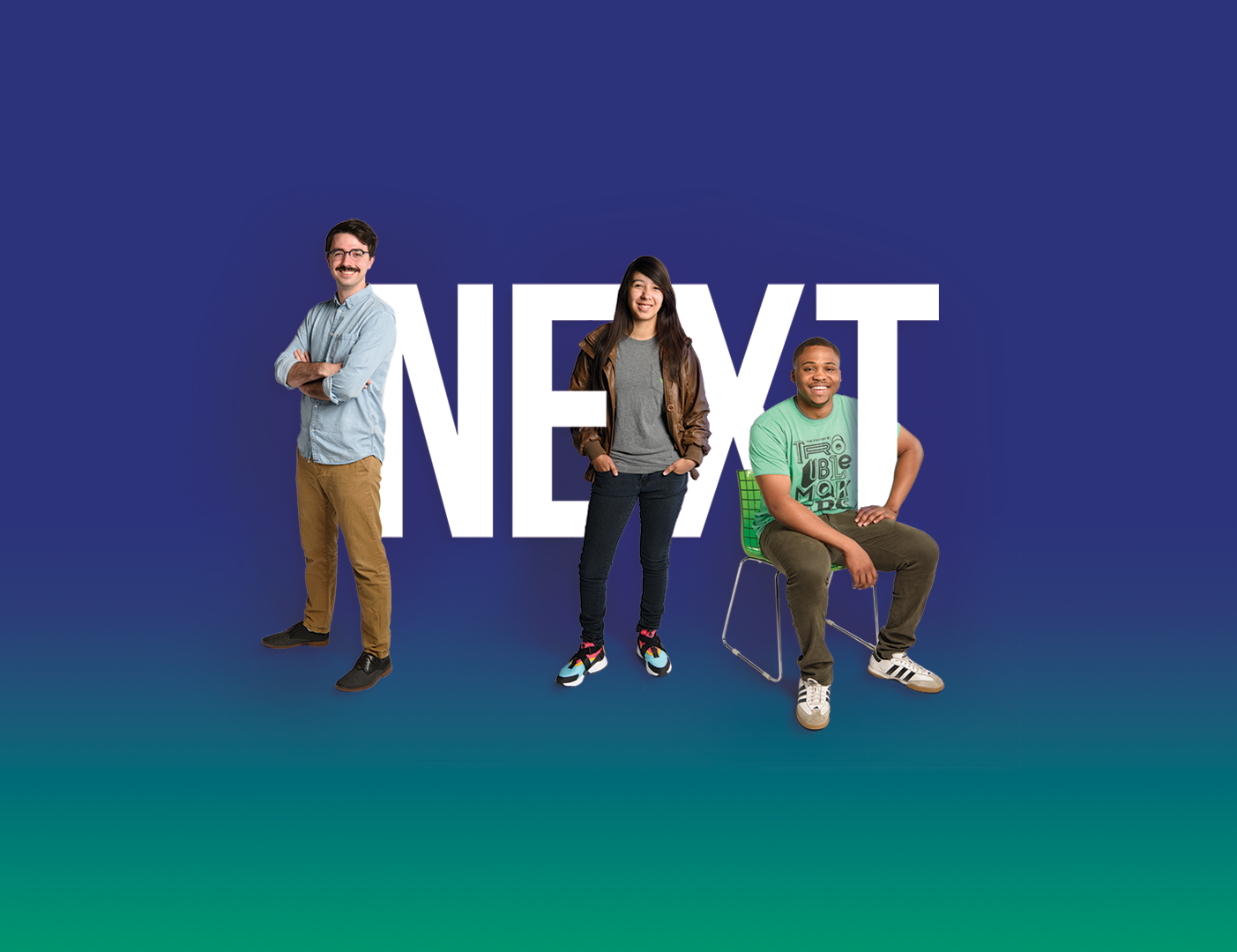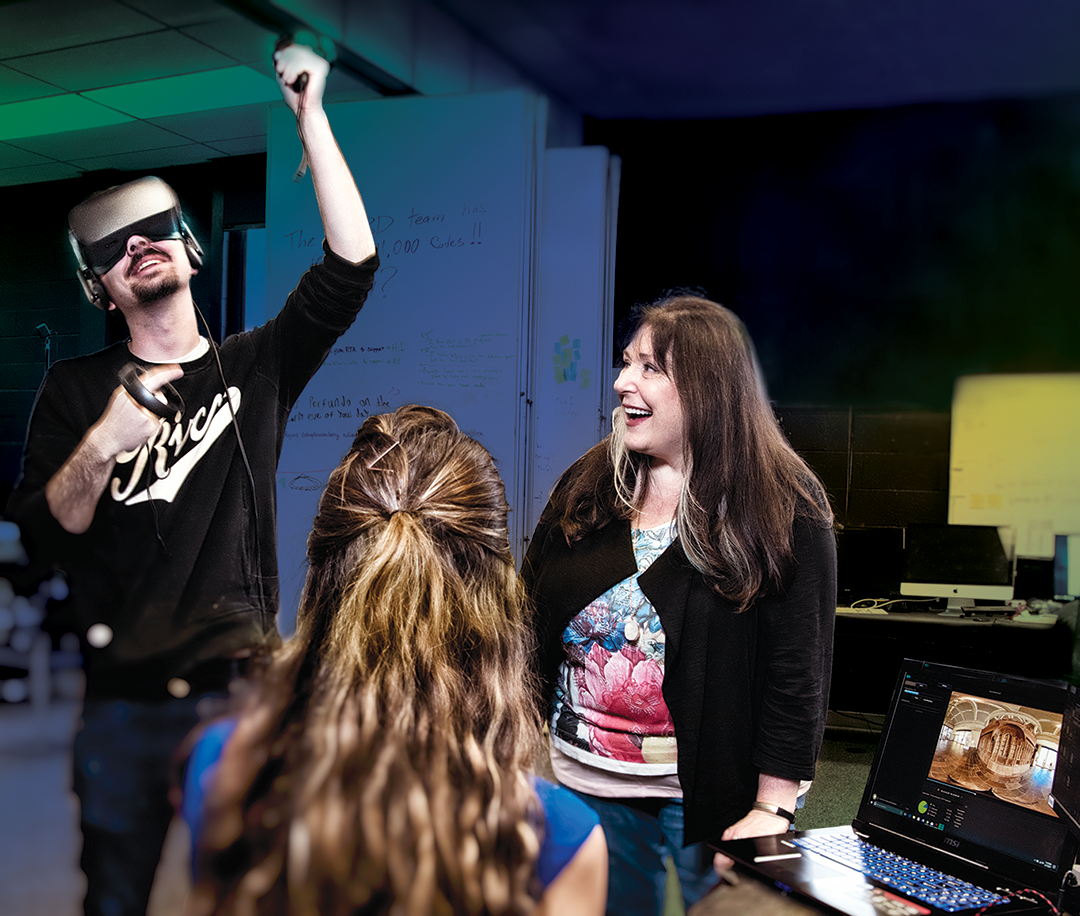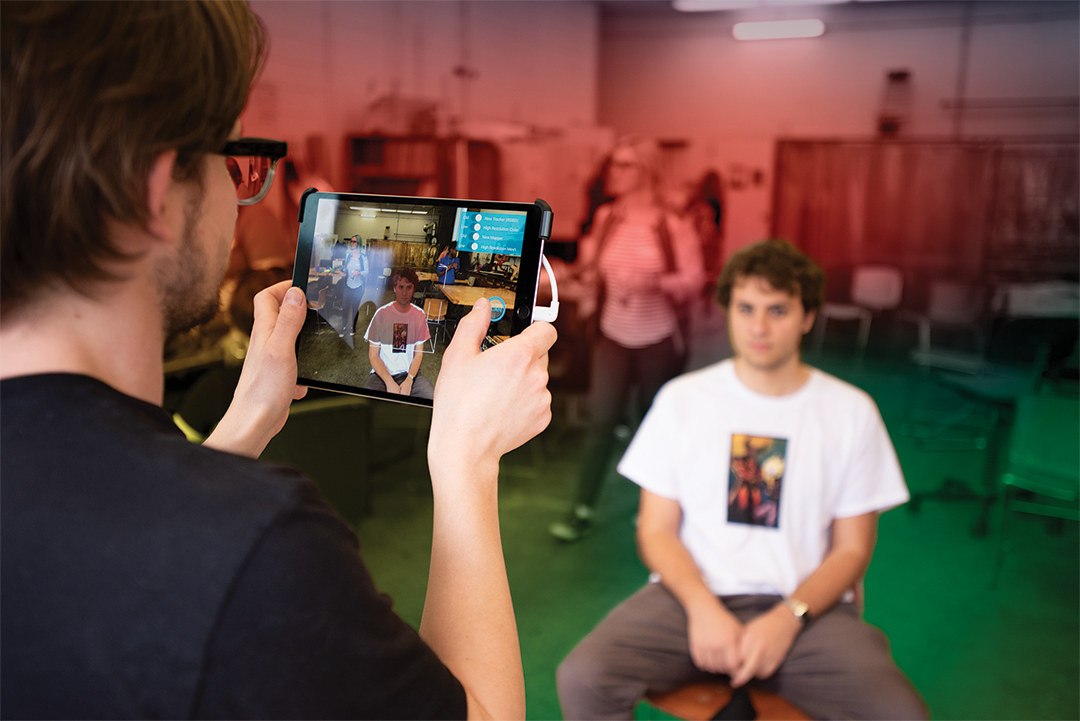September 13, 2018
When J.P. Abah applied for an on-campus student worker position in The Factory at Willis Library, he thought he'd be sitting at a desk providing patron services. It wasn't until after
he arrived in the UNT makerspace and interviewed with manager Judy Hunter ('00, '07 M.P.A.) that he realized he'd be getting interdisciplinary experiences
and skills in addition to a paycheck.
In one year on the job, Abah, an international student from Nigeria studying mechanical and energy engineering, has learned to 3D print computer-generated models, use computer numerical control technology to laser cut and mill different materials, view micropixels with the Amoeba dual purpose microscope, generate 3D models with Solidworks software, preserve artifacts and objects using the Ein-Scan Pro 3D scanner, facilitate robotics workshops using LEGO Mindstorms, and use Blender and Unity software to create 3D and 2D video game environments.
Much of the software Abah's learned to use in his engineering courses is available to the entire UNT student body at The Factory, which opened a second makerspace this fall at the Discovery Park library.
"Everything you need for your career doesn't come from one experience or one day, but from collective experiences," Abah says.

From left, UNT students Max Parola, Bri Delgado, J.P. Abah (Photography by Ranjani
Groth)
The Factory is just one way UNT is facilitating cross-disciplinary learning experiences for students. With 60 percent of post-millennials expecting to have multiple careers before age 30, as well as an understanding of rapidly emerging career fields and professions, UNT is providing opportunities for students to grow with the creative economy -- in a place where creativity and technology unite to drive innovation in a digital age.
"Our students come in wanting to uniquely mold themselves and further develop the skills they naturally possess," says Jennifer Cowley ('97 M.P.A.), provost and vice president for academic affairs. "They won't be satisfied with a traditional degree plan, and we need to help them identify the areas where they have deficits and provide an individualized path to help them find success."
Fostering these tech-savvy students' interests and skills isn't limited to the classroom. UNT is committed to becoming a leader in next generation education, stressing the importance of cross-disciplinary experiences through a mixture of academic, recreational, technological, research-focused and collaborative partnership opportunities.
Fostering opportunities
Gaming has long been a hobby for marketing senior Bri Delgado. But her experience establishing and managing a Counter-Strike: Global Offensive team for UNT's esports student organization provided the first taste of what it would be like to work professionally in the esports field, a rapidly growing industry that grossed $696 million last year and is predicted to grow to $1.5 billion by 2020.

Design and new media students work in UNT's xREZ Art + Science Lab directed by Associate
Professor Ruth West. (Photo by Angilee Wilkerson)
Following two years as a gaming director and advisory board member for the student organization, Delgado got a job as an online tournament administrator with Tespa, the world's largest operator of collegiate esports leagues. During her second year with Tespa, Delgado led a team of four other college-age students to coordinate and host online Overwatch tournaments in the U.S. Players in tournaments facilitated by Delgado were awarded more than $100,000 in scholarship funds last year.
Delgado, a Terry Scholar, credits her academic experiences and work with Tespa for helping her land an internship this past summer in Irvine, California, within the esports division at Blizzard Entertainment, one of the world's premier game developers and publishers.
Who are Generation Z?
The generation after Millennials, Generation Z -- people born from 1995 onward -- makes up 25 percent of the U.S. population, a larger cohort than the Baby Boomers or Millennials. Today's students, most of whom are Gen Z, are characterized as a mobile, boundary-less and video-centric generation who:
- Place a premium on entrepreneurship, innovation and DIY
- Expect and prefer to approach work differently due to technology
- Expect a short work tenure and strive to gain transferable skills
- Consider the Internet the authority, thus think and approach problems differently
- Desire feedback and difference making
- Respond to honest and authentic messaging
- Prefer real-time, transparent and collaborative communication
- Are self-starters, self-learners and self-motivators
Source: Ryan Jenkins
"I wanted a major that could be applicable to all my passions -- gaming, music or anything else I might find myself doing. I chose marketing and added a concentration in professional selling because esports is a new field and I knew it was important that I be able to explain and promote the industry," she says.
This fall, Delgado is focusing on esports commercialization as a patent intern with UNT Libraries. Following graduation in December, she plans to return to California to continue working in esports before pursuing a graduate business degree.

In collaboration with the Student Government Association, students in The Factory
this summer used a 3D printer to make a Braille map for the University Union. (Photo
by Ahna Hubnik)
Studies show that, like Delgado -- who is known online by the gamer tag 'bee' -- 60 to 70 percent of college students play video games. UNT has taken note. In August 2017, UNT Libraries opened esports and game design spaces known as The Nest in the Media Library, where students can compete in games on computers built specifically for that purpose. And, in January, UNT Esports was established within UNT Recreational Sports to support four varsity teams -- Hearthstone, League of Legends, Heroes of the Storm and Overwatch -- competing this fall.
"It's wonderful to see UNT's support," Delgado says, "because this not only provides an opportunity to compete for significant scholarships but also will draw students to the university."
Degrees by design
While cross-disciplinary academic experiences occur in each of UNT's 14 colleges and schools, they are the key focus for more than 1,400 integrative studies undergraduates in the College of Liberal Arts and Social Sciences. They design their own degrees by selecting three academic areas of study. A unique version of this degree also is being offered to the first cohort of freshmen next fall at the UNT campus at Frisco, which will create hands-on experiences for students through corporate partnerships.

After completing an internship with the Dallas Cowboys, Alex Shaw ('18 M.S.) was hired
on as a personal trainer for Cowboys Fit, located at The Star in Frisco. (Photo by
Michael Clements)
"Employers tell us that they aren't hiring graduates with a specific major but those who can think critically and work well with others," says Susan McCutcheon, assistant dean for advising in the College of Liberal Arts and Social Sciences and director of integrative studies. "This degree provides students with a firm foundation to support their unique career goals."
Integrative studies has grown in popularity the last five years. Alison Chapman ('14) credits the degree for providing her with a diversified background that helped her to become a commissioned officer with the U.S. Air Force.
"The program was an opportunity to explore a broad array of interests -- history, women's studies and human development," Chapman says. "It perfectly prepared me for military service, an honor I am proud of every day."
Research breakthroughs
Research at UNT also takes an interdisciplinary approach, especially in the xREZ Art + Science Lab directed by Ruth West, an associate professor of design and new media. Through Max Parola's ('16) work in the lab -- a creative studio and research lab with a focus on new discoveries at the intersection of arts, sciences and humanities -- he became interested in human computer interaction research and saw how it translated into the growing industry of interaction design.
Parola joined the lab in 2014 as an undergraduate studying psychology, and he developed research skills working on projects focused on virtual reality, human computer interaction and 3D segmentation. He says his lab time inspired him to enroll in UNT's new master's in design program, with a concentration in interaction design, which involves designing interactive digital products, environments, systems and services.
We're focused on building new products, developing new technologies and moving into
an advanced world of online education that is next generation -- not your grandmother's
online classes.
President Neal Smatresk

This spring, art students in Justin Archer's ('12, '16 M.F.A.) Beginning Sculpture
class created scans for 3D sculptures using a sensor attached to an iPad Pro as part
of a class project. (Photo by Ranjani Groth)
"I've always been interested in technology, psychology and design, and interaction design requires elements of each. As an interaction designer, I have to be able to pivot, adapt and re-evaluate things on a continual basis," says Parola, on track to become the first graduate of the program in December. "Working in a research setting complements what I've learned through coursework and enables me to draw from both."
As the nation's 29th largest public research university and ranked Tier One by the Carnegie Classification, UNT continues to encourage and support cross-discipline research opportunities. This spring, the NetDragon Digital Research Centre was launched. Sponsored by Chinese gaming giant NetDragon, it will provide unique opportunities for research, student internships, faculty training and deployment of online courses to further enrich student-learning experiences. UNT also is working with NetDragon to develop a smartphone application for campus communication and numerous other projects.
"Working with NetDragon will fundamentally change how we do business and change the character of our institution," President Neal Smatresk says. "We're focused on building new products, developing new technologies and moving into an advanced world of online education that is next generation -- not your grandmother's online classes."
Responding to industry
Innovative partnerships continue at UNT's campus in Frisco -- the second-fastest-growing city in the nation -- where the needs of industry help inform the programs offered. Degrees in advanced data analytics and consumer experience management are among those recently established to prepare students for the changing workforce. Sport management degrees also will be offered at the campus in Frisco, known as "Sports City, USA." It's directly across the street from The Star, the Dallas Cowboys world headquarters, and within five miles of Toyota Stadium, home of FC Dallas soccer; Dr Pepper Arena, home of Texas Legends basketball; Dr Pepper Ballpark, home of Frisco Roughriders baseball; and the Dallas Stars hockey headquarters.
"The location of our programs in Frisco will give us a strong advantage in offering students a network that is not available elsewhere," says Bob Heere, UNT's director of sport management. "We can build one of the premier sport and entertainment management programs in the nation."
To best prepare students for careers in the future job market, UNT continues to cultivate partnerships with industry leaders that provide internship opportunities. In addition to Texas Motor Speedway, UNT has partnered with the Dallas Cowboys to facilitate student internships.
As an intern at Cowboys Fit, a luxury gym located at The Star, Alex Shaw ('18 M.S.) gained the valuable business and sales knowledge he needed to launch his career as a personal trainer.
"I knew how to help clients get the results they wanted, but first, I had to get clients. Selling was something I had to learn -- quickly," says Shaw, a May graduate who earned a master's degree in kinesiology. He hit his stride as a personal trainer and, following graduation, was offered a full-time position with the Cowboys.
"Because of UNT's partnership with the Dallas Cowboys, I've been able to enter the fitness industry at the top," he says. "I was in the right place at the right time and empowered to enter the exact career path I wanted without speedbumps."
Knowing that more students than ever before -- 63 percent according to recent surveys -- will seek entrepreneurial paths after graduation, Smatresk has charged faculty to explore out-of-the-box thinking and take risks in the classroom so they can best model those skills for students and provide personal insight.
Over the last two years, UNT leaders also have worked with the Toyota Production System Support Center to diagnose specific issues within existing UNT processes and reimagine them to best fulfill university needs by implementing Toyota's award-winning lean process framework. The faculty hiring and onboarding process and graduate school admissions have been reimagined as a result.
UNT's willingness to execute new ideas, re-evaluate them when they don't go as planned, tweak them and try again, is a positive thing for students to observe, says Ryan Girardot ('18), winner of the 2017 UNT Innovator Award. The recognition is given each year to faculty and students for finding creative solutions to today's most pressing issues.
"Universities more and more need to be hubs of innovation," says Girardot, co-founder of EPLAY by Players Revolution, a digital player profile for basketball players. "You do have to have this environment where it is OK to throw what might even sound like a crazy idea out there and it is taken seriously."
Technology for success

New media arts assistant professor Liss LaFleur, right, is fitted with an electroencephalogram
device by student Brittany Armstrong. The EEG device and software use the brain activity
of the wearer to manipulate digitally or physically created objects. (Photo by Gary
Payne)
UNT has long thought of the future needs of its students. In the 1990s, the university emerged as a leader in online education, becoming one of the largest providers of online credit courses among Texas public universities.
Now looking ahead, in addition to developing the communication app with NetDragon to help students be more successful, UNT is seeking to overhaul its online courses to be even more responsive to their education needs and learning habits. This begins with the introduction of a new learning management system, Canvas, which will replace all Blackboard classes by this spring.
Jacqueline Ryan Vickery, associate professor of media arts, conducts research on young people's digital media practices and how they intersect with issues of equity, identity, privacy, literacy and policy. She says that students crave instantaneous access and expect technology to be available at all times, and that, therefore, educators need to adapt.
"With the constant introduction of new digital platforms for networking, co-working and social interactions, it's important that universities teach students the framework to acquire technical skills that will be needed as new products are created, rather than teach existing programs," Vickery says.
Existing courses also are being reimagined to flourish amid new technologies. With countless resources available for students online, UNT jazz history professor John Murphy eliminated the textbook, which he believes limits learning, and created a 100-percent online course that requires students to seek and evaluate information themselves, starting with UNT's abundant library resources.
He compares the textbook to the safe and predictable experience of swimming laps in a pool.
"My job is to coach students to have an authentic learning experience amidst the sea of information available," Murphy says. "I've developed my course in a manner that enables students to learn in the open water of information."
Every step UNT takes toward becoming a next generation university involves making sure students are set up for success. Regardless of whether they are taking courses online or on campus, UNT is focused on ensuring every student has access to the same services and educational experiences.
"Everything we do is to prepare our students to become the creative leaders of tomorrow," Smatresk says. "When they leave UNT, they will be well-rounded, confident individuals prepared to excel in the rapidly evolving workforce."